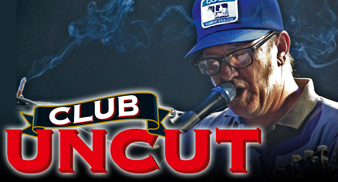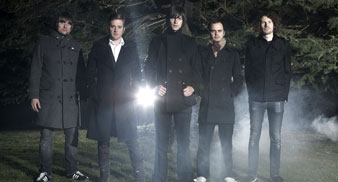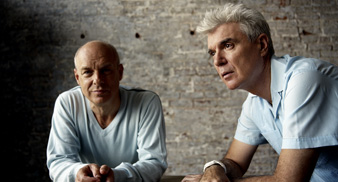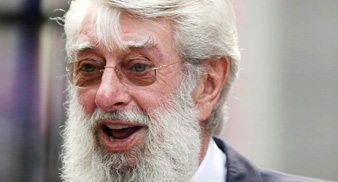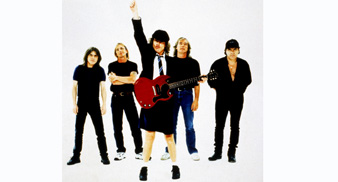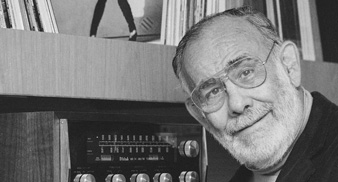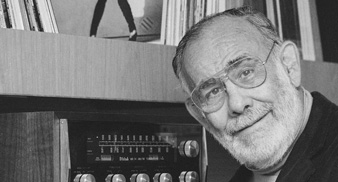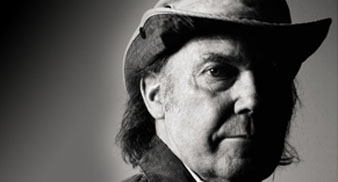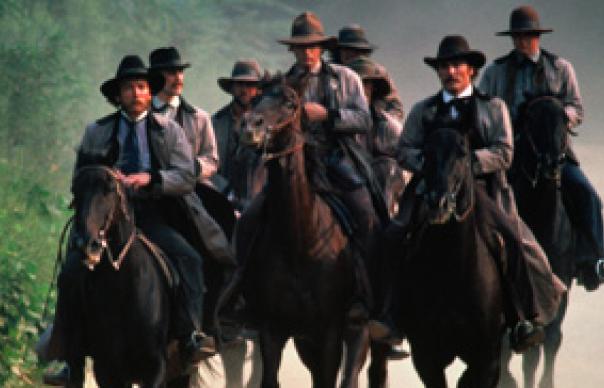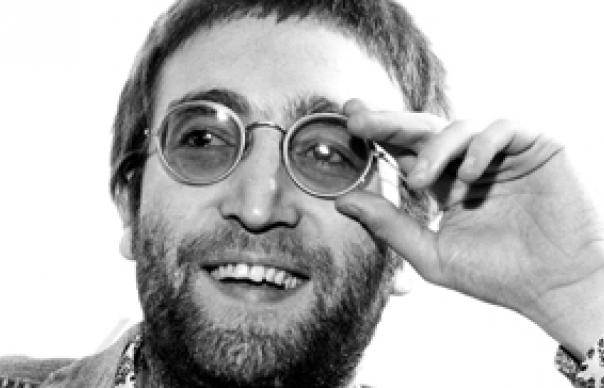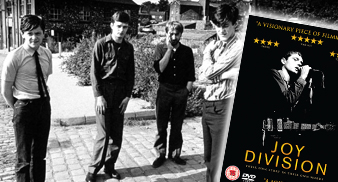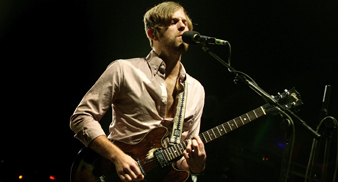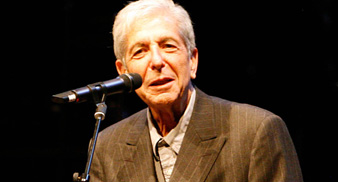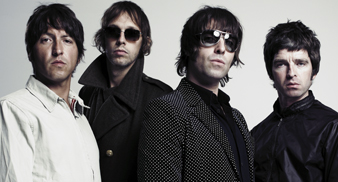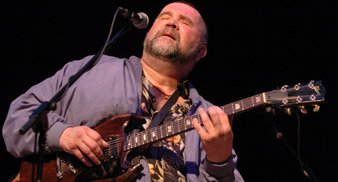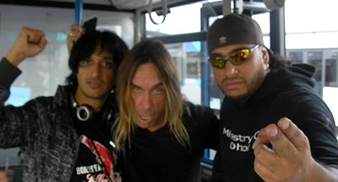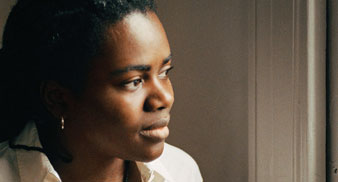When Klaus Dinger died a few months ago, I mentioned in an obit here that I had an unpublished interview with Dinger and Michael Rother, from when they briefly reunited to promote the Neu! reissues in 2000.
Amazingly, I’ve finally located the interview tape, so here’s a marginally edited transcript of the hour I spent with Neu! in an Italian café at the Islington end of Holloway Road. Last time, I wrote, “What I remember of the interview was two men who could barely tolerate each other’s company, who clearly weren’t going to be reunited for long, and who had grown into middle age in radically different ways. Rother was a suave European technocrat, dressed discreetly in black, every inch the calm paterfamilias of ambience.
“Dinger, on the other hand, was immensely warm and unpredictable. He had wild eyes, the hair and beard of Catweazle, and photographs of his girlfriend Sellotaped and pinned to the front of his shirt.. . At the time, there seemed a chance that Neu! would reform to play gigs again, but an hour in their company immediately proved how impossible that would be.”
Listening back to the interview now, it strikes me that the pair were, with a pragmatism that did not come easily to either, seriously planning to work together again. Evidently, that never happened. But if anyone knows what happened after this, and what was the catalyst for the final, irreconcilable Neu! split, I’d be fascinated to hear.
John: Up until about a couple of days ago I had no idea that you were even working together, even communicating or anything. When did you both get back together again and start talking, is it very recent?
Michael Rother: Not sure. Let’s think back. Do you know Herbert Grönemeyer the German musician?
John: No, I’m sorry I don’t.
Klaus Dinger: Nobody knows Herbert Grönemeyer in England.
MR: He’s a very well-known musician in Germany. Anyway, he had a project last year and it was featured in a big way in Germany; a very big project with eight CDs covering 50 years of German music, and he had the idea to have Neu! Onn that. We ended up with two tracks, also La Dusseldorf and one of my solo tracks. And so we got to know each other and then the plan developed from there to even re-release the Neu! originals on his new label which is just starting out.
John: And this is Gröneland? Oh right, I see.
MR: So that’s just starting now and Neu! will be the first release on that label.
John: Was that easy to organise, after so long of having vague discussions about reissues? I remember I found a quote from you, Klaus, talking about wanting to move to Japan and to ignore European, Western trade rules. There seems to be a long dispute about trying to put these records out again, probably.
KD: Right. Ten years ago, there were dealings and court cases and all sorts of stuff. Attempts and no attempts…And, in the end Grönemeyer made it.
John: How long had it been since the two of you had met together?
KD: Not too long. I guess ’98…’97.
John: If you believe all you read on the internet, you would get the impression that the two of you haven’t been close in the past few years.
KD: We’ve never been very close. I think the only thing we’ve done is make music together, and in my opinion, the only thing we can do. I mean, we would never go on holiday together or things like this. I think the only thing we can do is make music.
John: When was the first time you met? Did you know each other before you played together in Kraftwerk?
KD: No.
John: So when you both joined that line-up that was the first time you met?
MR: I think the first time we personally met was when I came to the Kraftwerk studio one day to join in a session, and you (Klaus) and Florian were listening…maybe you remember?
KD: I had a different memory on this point.
MR: Okay, I see. Anyways, I was playing bass in this session and I enjoyed it. Ralf Hütter was playing his organ and there was a drummer and Florian and Klaus were sitting in the studio just listening to everything.
KD: Was I really there?
MR: Yeah.
KD: I mean, it’s possible. It was all of 30 years ago, about.
MR: That was the end of the story, we just exchanged telephone numbers. Then, shortly afterwards they called me and said, “Do you want to go onstage with Kraftwerk? Do you want to do some shows?” And then that was it. I mean, I enjoyed what I did that day, so I said, “Yeah. Let’s start.”
KD: I remember this, I came with Florian together, I came to a club somewhere where you were playing there with your band at that time.
MR: Oh, right. That was a bit later. Because, when I was in that session and we exchanged numbers, you had my name and so I said, “We are doing one last show—Spirits of Sound, my group at that time—one more last show, and they said okay, “Let’s see what he sounds like and what he’s done.” And at that time, at that show, I remember quite clearly, that Klaus and Florian said, “We like the drummer. That was “Welcome to you!”
John: What compelled the two of you to work together on your own as Neu!?
KD: Well, I mean, it was pretty obvious from the beginning that Kraftwerk was Ralf and Florian.
MR: Yeah.
KD: And, we intended to establish ourselves. Somehow, it just developed like this. I mean, we’ve been working pretty close, played live quite a lot with Florian together as Kraftwerk. I somehow heard—Michael will probably tell you a different story now, about this point— that I and Florian had differences or personal problems or something. Which I think was never the case. My memory tells me that Florian and Michael often had problems. I should say Florian was sometimes very unkind to Michael. So, for me it also had something to do with solidarity with Michael. And, for me, I was always convinced of Michael as the guitarist.
John: What about what you said, Klaus, that you didn’t have anything in common? It seems strange to start a group with just the two of you if you never felt that there was that much common ground between you.
KD: Musically, I would say blind understanding.
John: Blind understanding?
KD: Yeah.
John: Really?
MR: That’s what I wanted to say to the question before. When we were performing with Florian, apart from the problems that I recall—like, it was some kind of psychological warfare sometimes; anyways, doesn’t matter—there were some very great differences between Florian, Klaus and Me. Very different. Florian was not so much in favour of the direction in which the music was going. Klaus and I had the same idea so it was easy for us to go off on our own.
John: Can you put that idea very simply?
KD: I don’t know if we really had some plan, except trying to do it on our own and make a record on our own. Normally, if we go somewhere or meet somewhere on a music basis and record something, I don’t think we have to talk about these things. I always had the feeling it emerges sort of automatically. The problem is getting us together at the same place with, you know, instruments and things around us, and so on…
John: But what you created was a revolutionary sound…
KD: Yeah and? What’s the problem?
John: Well, I guess that is something that does just appear out of your heads. So it must have been something very special that happened when the two of you started making music together?
MR: But it was not the result of a musical theory. It was, of course, the result of everything we thought; the ideas we had of music in general. But it was not, like, “Now, let’s make the musical expression of industrial landscapes!” or something like that.
John: Well, what was it that inspired you? What were you listening to at that time?
KD: At that time? I have no idea. Michael, what did you listen?
MR: I think at that time I wasn’t listening to much music, I was concentrating on my own stuff. I grew up listening to a lot of English/ American pop music—everything from The Beatles to Jimi Hendrix and stuff like that. But, that was a stage that had gone from me at that time.
John: What about the Velvet Underground?
MR: That was in the background too, yeah.
KD: For me, it’s a different story. Velvet Underground was in there. Also The Beatles, several years before, like Michael said, also The Stones, all the big ones I would say. Well, not all the big ones.
John: What about all the contemporary German bands that surrounded you?
KD: No… I mean, can you name one?
John: Can?
KD: Can? At that time?
John: Yeah.
KD: Oh, I never really liked them.
MR: I liked some of their music.
KD: I mean, that doesn’t mean personally. I mean musically.
John: I’ve seen, I think it was you, Klaus, say, that you never thought you had anything to do with that Krautrock movement? With the name Krautrock?
MR: But we didn’t have that impression, we had that movement. We played with Can, we had one or two shows with them.
KD: Yeah. We met them quite often.
MR: And later on, I liked some of their records, but it was not the case of listening to Can or Amon Düül—I don’t even remember any records by Amon Düül.
John: What about Faust?
KD: No. No chance. All totally overrated.
MR: I’m not giving any judgment, but it wasn’t important really. It was only important to concentrate on your own ideas. And, maybe something in the air made similarities develop. Certain similarities as opposed to American or English-American Music.
John: Do you think there’s been a lot of theorising, certainly in this country, about what stimulated a big uprising of German music in the early ‘70s? People have talked about German artists trying to create a new idea of what German art should be in the wake of the war. Do you think that was part of what you were doing?
MR: I was just concentrating on developing my own ideas. I was not concentrating on German—
John: But, you’ve heard that theory before?
KD: You need all these categories… I think we were quite different from all the rest.
MR: That was the main idea, I think. It was certainly a big deal for me: to develop something of my own, something that was not directly developing something you picked up from somewhere else.
John: Can you remember what it was like putting up that first album? Because you did it in four days—is that true? What was it like?
KD: Quite hard, right?
MR: Yes! It wasn’t so easy!
KD: We did it in four days, and after two days nothing on the tape
John: Really?
KD: And, financially we were on a very low budget; all sleeping together with Conny Plank in his room in Hamburg. It was unusual for us to do
MR: We dangled on a very thin wire putting that together
John: When did you first realize that you had done something pretty amazing?
KD: I was always convinced of that. I knew it always, but it was only a question of time. I remember it was not so easy. Conny also had a tough time at that time. It was another delay, and another delay, and he was working as a freelance engineer. It was quite chaotic, everything. You could never be sure that it would really happen. It could have been a big failure.
MR: It was kind of magic to hear “Hallogallo” for the first time on tape for me. I remember listening to it, and to be able for the first time to record that kind of music—I was in the recording studio earlier recording completely different music but it wasn’t this.
John: So, once you recorded the album, did you have a whole idea of what Neu! should be? I mean, there was this whole kind of pop-art packaging, the style of the band. Did you ever envision that?
KD: Let’s see, I was living at that time more or less between the art academy, where many of my friends were or advertising companies, also where my friends were. So it was quite naturally for me how this emerged, no problem. Visually for Michael it was something else and not exactly easy to convince Michael of these things. But in the end, eventually, you know, we agreed.
John: You keep coming back to how you were in totally different places. Can you explain what these places are? I’ve read that you took a lot of LSD [Klaus], whereas you might not have [Michael]. Did that influence the dynamic between you?
MR: (Laughs)
MR: I don’t want to give away any information about any drug habits or experiences, but there are some mistakes being spread about that. But, of course it doesn’t change the general difference.
KD: But it was an expression of the general difference. A lot of music on the Neu! record happened while I was on whatever, but it’s very important as a counterpoint or complement. For example, Michael or Conny wasn’t most of the time, although he liked to smoke at least; Michael did also, though not in the studio.
John: So you were tripping quite a lot of the time you were recording?
KD: Well, not always, of course, but yeah, I still like it. Not now and here, but I would recommend it, though certainly not just to anybody.
MR: See, for me it’s completely different. I can’t work on music when my mind is fogged. Not with alcohol or anything else. I can listen to music, well sometimes, in other states. There were quite interesting periods. But when working, I have to have a clear head.
John: So, when the first album came out, it was a success immediately?
MR: In Germany, quite. But, what is a success?
John: Did you feel like you were famous?
MR: Well, you could go to Düsseldorf’s amusement area and pass several discotheques and hear “Hallogallo” so that’s a sign, I think, that it was successful.
John: How did that make the two of you feel?
KD: It should have been more. It’s difficult to analyse all this. I had all these big problems with the music establishment, and we didn’t have management and all these things that you must have to make this a success.
John: Do you realise the influence you’ve had on music has been huge in the past 20 or 30 years?
MR: What influence?
John: The influence you’ve had on say, Techno music has been huge, do you not agree?
MR: You can sometimes imagine similarities. But I think it’s very dangerous to stand up and say, “I am the father of ...”
John: Yes, but so many people—I know you have issues with the term, Klaus—have used that motorik beat that you invented.
KD: Careful. Careful with the inventions. I think that that music is thousands of years old, maybe we just picked that and focused on that and somehow remoulded that, instead of fiddling around with all sorts of stuff.
John: It’s a very radical sound that you’ve created, the two of you.
KD: No
John: I mean, David Bowie, how much did he take from it? You know, it’s an amazing idea that people still find these ideas inspirational after so long of a time, don’t you think?
KD: Hmm… I don’t know.
John: I think you’re being very modest.
KD: Well, I don’t know what I think, I guess. I think it’s very difficult to copy that to something close to it. I mean, it’s a big difference because we did everything as human beings with our heads, our brains, our hands. To push buttons is a totally different story. To push button and then get, think you get, this rhythm. I don’t think so.
MR: That’s another difference between us. Nowadays I use buttons a lot and I enjoy it maybe too much.
KD: Yes, but you also get a bill for that. I think the human factor is unbeatable, everybody feels it, I think.
John: I’ve seen quotes, especially with you Klaus, where you’ve said you’re not happy with the term “Motorik” referring to your music because it dehumanises the sound you’re orchestrating?
KD: But see, “Krautrock,” the term I find horrible. At that time I found horrible and some of our industry people invented this as a category.
John: Wasn’t it Faust that invented it? Anyway, let’s go on to the second album. How long did you spend on the first side?
MR: We spent 95 per cent of all the money on only the first side. That’s really true. We had only one night.
John: So you put together the second side in one night.
MR: Well, yes. But there were also the singles which we had already.
John: Whose idea was it to do those tracks for side two so quickly?
KD: That was, of course my idea.
John: How did the record company react when you presented the album to them like that?
MR: I can’t remember. I think they didn’t understand it in the first place, although the second side is a bit more crazy than the first side; and, of course many people were irritated when that was out. They thought we were making fun of them which we weren’t. No way.
John: So what caused you to split up after that record?
MR: I felt unhappy after the second album. I felt like some of my views were shut out. I thought that new ideas were necessary, some new aspects and at that time we had this invitation of a English company, United Artists, to do a tour in England and we talked about the possibility of including Cluster
John: As part of Neu!?
MR: Yes, to help us onstage. Not on the album, but onstage; and at that time we already knew them and I liked their first album. I visited them, and realized that this is what I was looking for. So that was my reason from moving from Düsseldorf to the place and we started with Harmonia.
John: Is that how you remember it, Klaus?
KD: Granted, what I remember is that the whole situation was a bit too crazy for Michael.
John: How so, crazy?
KD: Well, I understood that he had this need to somehow go to the country and live; quiet, smooth and nice and so on—just another proof of our totally different personalities.
MR: I have to contradict a bit, because the reason for me to move to the country was not to live in the country. It was to be able to work with Roedelius and Moebius. That was the first main reason for me to move from Düsseldorf.
John: So what made you get back together again, for the third album?
MD: We had a contract.
John: So that’s all it was?
MD: Yes, and well, from my point of view I had worked with Harmonia for a while. I had experimental ideas, musical ideas that didn’t fit into our concept. And so we had no split—there are some mistakes about that—we had not split.
KD: The reason for the last album for me was, in the meantime I founded my own label and went bankrupt with it. For me, it was the chance to get back at least a little money or to pay back my debts—which doesn’t sound very professional, I must say, but so was it.
John: So then you made this album and it sounded like the work of two bands in many ways? “Hero” and “After Eight” are very different from the rest of the album.
MR: Second side is more Klaus, it’s easy.
KD: I would not say so much. In principal it was not only “Hero” and “After Eight,” there was a track in between. It was also part of the concept for the first two albums I think.
John: Yes, but it sounded a lot angrier on tracks like “Hero” and “After Eight.”
KD: I was really angry. I was angry about the industry. Very angry about the industry.
John: Were you amazed when you heard Punk Rock and The Sex Pistols a few years later and how close they were?
KD: No, I thought, “Nice.” (laughs)
John: And so then you went your separate ways again and there was never any contractual tie for you to come back and do anything else?
KD: Oh, yes, we tried. For instance… I remember with Thomas and Hans who were both already on the third Neu! album, we visited Michael for a few days, and were welcomed very friendly and I still at that time found out that I could not go to the country. I had to stay in the city.
John: You couldn’t actually bear the country?
KD: At that time.
John: Why was that?
KD: No, no. Somehow, it was too quiet, natural. I mean, that changed at some point, but at that time, that was it. But, it was an attempt, wasn’t it?
John: What do the two of you think of each other’s music that were making separately?
MR: I liked some of La Düsseldorf.
KD: I probably liked some of Harmonia. (both laugh)
John: You’ve been less diplomatic about it in the past, Klaus.
KD: Yeah, if it comes to the point I am certainly not diplomatic
John: Come on, let’s come to the point, then.
KD: Eh, maybe later.
MR: Well, I’m honest about it. I like some the album. Klaus has his own ideas in music all the time and I have mine.
KD: I also share his views of music. I find it maybe a bit one-sided. I was always interested in good and bad, and light and dark, so opposite things. For instance, when were playing with Florian, Florian who was also very versatile, he could also be very bad and nasty musically, but also play very nice things, so when Florian somehow was gone I had the feeling I had to substitute these small darker sides. I think it’s important that music is not only nice, and that is what I would not say I’m not so enthusiastic about Michael’s solo things, it is all too nice. But, I also understand that he can see it differently.
MR: I can see it differently? It’s not that, um, well, how to explain really—it’s not simple with music being nice and not-nice. I see light and darkness in my music. And I see despair and beauty and everything, but you have to look much closer. And maybe many people cannot look that close or do not want to look that close, but it’s there; I see it. I would not want my music to be just some kind of happiness. Nobody can experience that only. That would be boring to create or to give as an impression of my life. But anyway, music is what the people hear and what you can make out of it. And that depends largely on what you are able to feel. And if you can’t hear that and you don’t want to hear it then you won’t.
John: Do you think you’ll ever make music together again?
MR: That’s a very big question…
KD: You mean in the future, on a project?
John: Yes
KD: That is a difficult question. Which, I think that with the current events with Herbert Grönemeyer we’ll certainly put that on the table again.
John: How do you feel, Michael?
MR: Things are changing all the time. I mean, if you had asked me one year ago I would have said, “I can’t imagine,” But now re-releasing the Neu! albums is such a wonderful thing to happen and, who knows what the next step can be.
John: Have you heard much about the music that the two of you had influenced over the years? Are you aware, I mean bands like Stereolab?
MR: I was in a concert once, it was strange; in Hamburg I went to a Stereolab concert with Sonic Youth and at one point I was not prepared—a friend took me-- I’m like, “I’m listening to myself,” it sounded a bit like someone playing Neu! It was funny.
John: Have you heard this kind of thing, Klaus?
KD: Not so much. I heard about names, but I never heard them. I didn’t care. I was always very busy with my own work, the time I really listened to other people’s music was before I started myself and since then it became less and less. I’m sorry about that but…
John: No, well it shows how original your music has always been, I guess.
MR: It changes. In my life it changes a lot. I listen to music from all parts of the world, it’s not only electronic. Sometimes it’s very old music, some Korean Folk music. Then I listen to some very electronic, very rough music. Sometimes I don’t listen to anything I concentrate on my own, so it changes all the time, it just depends on the situation of my work and my life in general.
John: Do you look back on what you did as Neu! as something to be incredibly proud of? A real landmark in musical history?
KD: I say yes. I think it’s the greatest thing that you can achieve, to last forever with what you did. And I think we got to realise it would difficult to top that. So, yeah, I like it very much.
MR: I think you would be lying if you denied being flattered if some big names and people said they’ve been influenced by you, if you like their music. Sometimes people say it and you would rather not (laughs). Proud is not the expression but I can say that I’m happy of having done most of it.
In a way I’m completely ready to admit that Klaus was more advanced in some ways. He was older at that time, that was a more important factor. He had some experiences in life that I didn’t have at that time. But, speaking of leadership, that’s something I’ve dropped in my life in very early days. I don’t accept a “leader” it’s not how I live my life.
John: What would you say, Klaus?
KD: I think for both of us, the main thing was the result. Maybe sometimes we had different opinions. Then again, I wouldn’t say there are very clearly songs that come from Michael and also the other way around. So, I would not really have interfered, you know what I mean?
MR: Anyway, it was not the idea of Neu! I mean, most groups work that way that there’s a leader. But, in Germany it’s a bit different.
John: I also think that the idea I’ve always had of Neu! was it wasn’t kind of the people in the band were very much the idea, it was more about the music. You know, there weren’t all the graphics with all the big photos on the front covers. I always thought of it as kind of an anonymous band.
John: So where are the two of you living now, where are you based now?
MR: Mostly, I’m still in the country and also in Hamburg. I split the time, I like that; being in the city, when that’s my idea of meeting people and hearing music, just going to clubs and stuff. I like both, I have both.
John: What about you Klaus?
KD: I’m mostly in the studio, which one is in Düsseldorf, although it is more an English studio, but I also have this place in Zeeland in Holland, close to the sea, which in the meantime I also like now after many years, very different as a conscious counterpoint to the city.
John: So you’ve got over your phobia of the countryside?
KD: Yes, but it’s not so much the country but it’s sea that is important to me. I think that I could not live somewhere countryside, for example, where Michael lives, somewhere in the middle of nowhere far from water.
MR: But, I live right next to a river. And, without that water I wouldn’t be living there. I know that. Water is very important for me too.
John: Are you aware of a lot of things going on with young German groups in the past few years?
MR: Like Mouse On Mars? I heard them play live once.
John: Did you like it?
MR: Um, parts. Not everything. But, I like the breaking up, the sound experiments…
John: Great drummer I think, when they play live
MR: They were without drummer when I saw them last, it was just electronics
KD: They now have a brilliant drummer? Oh, I don’t know. I only know them as a knob-pushers and I hate knob-pushers.
John: So I hear.
KD: But not really, of course. But for instance, [Can’t make out the name on the tape] is 26 years old, with whom I’m working since early this year. Very close, everyday. He came to Germany as a knob-pusher and we started with La Düsseldorf remake…
John: A remix? I thought you were very against remixes? Because there have never been any remixes with your Neu! material
KD: Wait a minute, it is not this remix. I call it remix, but it is a remix of original sounds, you know, take the material that is there but don’t add any knob-pushers, so you “mix” it new. That’s a bit different, I think. But, in the meantime, what I wanted to say is that he’s a great drummer, he’s a potential drummer in a potential Neu! record because I think he totally gets the point. But also, coming back to this computer thing—he tries to plant a Neu! single… and I think the idea is that we mix two songs. So, we mixed two songs and it was—
MR: You did that too?
KD: Well, I can only listen—
MR: Well, it was only mixing tracks, nothing new. It was just a decision on which track to concentrate for promotions, do a video or…
John: And which track did you decide?
MR: We haven’t decided yet, and that’s why we’re here for instance, also to talk to Herbert Grönemeyer and his crew. I wouldn’t mind “Hero,” I like “Hero,” it’s one of my favourite tracks of Klaus.
KD: I would say to that, two sides, to show two extreme sides of Neu!
MR: That is why I suggested doing “Hallogallo” in the first place
KD: I think it’s important in this short time to try to get the final result. But, I think that perspective emerged from that. That was after Michael tried and… you were not very pleased with the results. But I think, musically and artistically, it’s a great opportunity to do something else—because on the three Neu! LPs that never happened
MR: I’m entitled to my own opinion, but what I did, I liked it and I did it for my own fun. I wasn’t sure that to show both sides would be a good idea for Neu! but if the people—I mean they are investing a lot of energy and money and work into that—if they like it, then more or less, they are part of the work; and if they have an idea of what they think is the best first step now, then let them make a suggestion and we talk about it.
KD: How can they know, because they are not Neu!? They have no idea about Neu! It is also difficulty.
MR: Then you can’t talk with anybody about Neu! because only we can talk about it.
KD: Somehow, that’s true, I think.
John: It’s a difficult business getting back together
KD: I don’t know really if it’s so difficult. I think we are both also getting old a bit to understand that we have to do that somehow. Because, otherwise the release wouldn’t make sense if we don’t really cooperate
MR: Anyway, it’s a chance now. It’s a very big opportunity for Klaus and me. And, until now we didn’t have that opportunity because it needed, really, somebody like Herbert to be the third angle
John: Why was it so difficult to get these records out before, what have always been the stumbling block? You said there were so many people who wanted to put them out before, why was it that it never came out properly?
MR: That touches a lot of the dark spots. I’m not concentrating on the dark spots that much any more. I’m trying to concentrate now on what can develop. We had very big difficulties.
John: Between the two of you, you mean
MR: Yes. And that resulted in mistrusting each other, and some actions that the other one did not like and, that’s part of history. We have still to settle some of that, but the most important thing now is to agree on what we actually agreed on all the time. Basically, the re-release, to make that music available, and to spoil the business for those bootleg pirates. I mean, they have been selling them for years and years and making money, it can make me furious if I think about that.
John: I have to ask, what have you got written, there [on a sign stuck to his shirt]?
KD: This is the Japanese sign for love. I’m in love with a Japanese girl. Though, it’s a bit difficult (laughs)
John: Where does she live?
KD: She lives in Düsseldorf.
John: What does it say?
KD: (laughs)
John: Did she make it for you?
KD: Yes. Originally it was a bit bigger, and they scaled it down. It’s sort of a love letter. But, because I’m having difficulties with her at the moment I wear this thing here, praying that… we’ll see.


